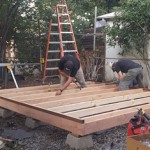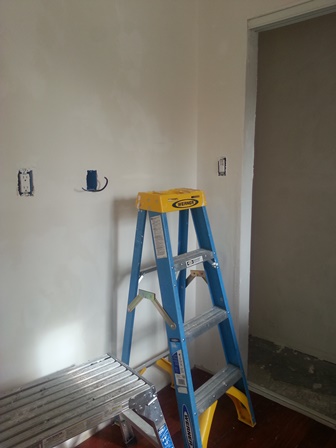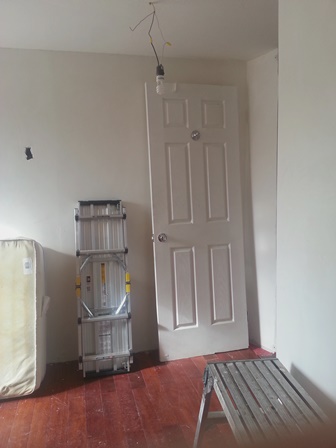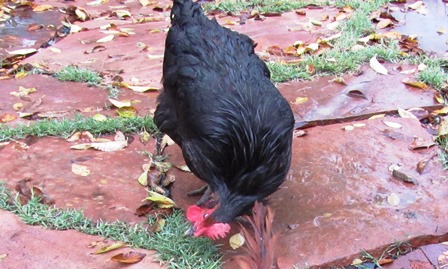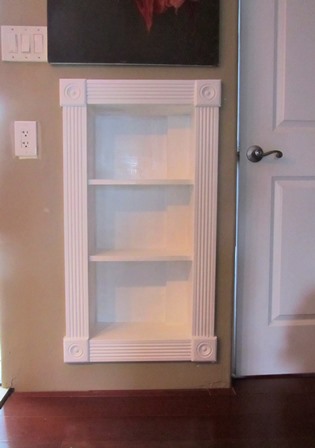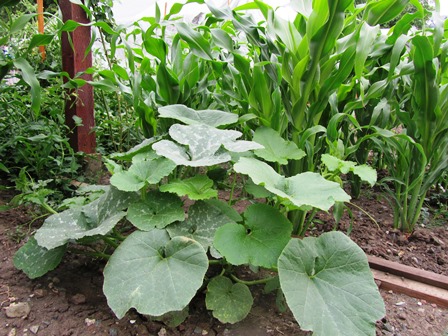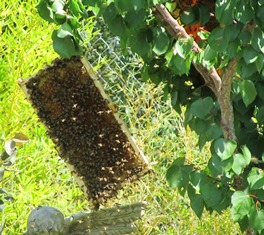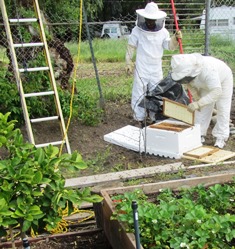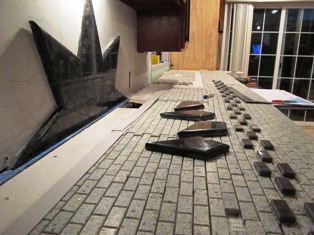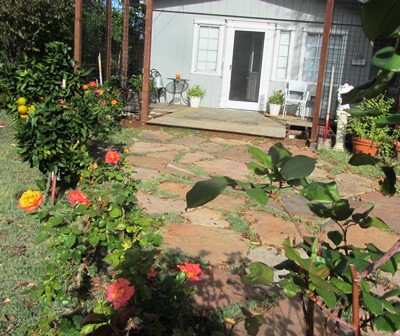Archive for the 'Renovation and Construction' Category
STORAGE PROBLEM? BUILD A SHE-SHED
My biggest issue with our 1,100-square foot house on the Henny Penny Farmette is lack of storage for all our stuff. Okay, so most of it is my stuff.
There’s no good place for the juicer, bread maker, mixer, taco press, deep fryer, sewing machine, dress form, extra dishes and pans, honey buckets, bee keeper suit and gloves, fabric and threads, boxes of jars with rings and lids, books, and art supplies. We keep moving our stuff around to accommodate other stuff.
When I want to put honey into jars, make jam, or do a ceramics project, for example, the process of hunt and find becomes exhaustive. For a ceramics project, I have to track down the tile saw. In my closet, I’ve moved boxes of shoes to accommodate hammers, drills, a box of drill bits, an arm saw, a saws-all, boxes of screws and nails of various sizes, and power tools. Seriously. What woman in her right mind forgoes her collection of high heels for power tools?
My easel, oil paints, brushes, cans of turpentine, and canvases are all stored in different places around the house. Supplies must be found and laid out on the kitchen counter before work on the piece begins. The easel goes up and a time-consuming search begins for the canvases.
The solution to the storage problem might seem obvious. Buy a shed. I did that. But it didn’t turn out so great. I bought a ten-foot square wooden shed to assemble onsite. It was duly delivered. But upon opening the box, we realized how inferior the building materials were. We could see it collapsing under the first hard wind and rainstorm.
- Constructing floor struts
Hubby hurried off to the DIY store in his truck and brought home everything we needed to build a really, strong storage shed. He’s an architect and knows such things. So the piers were set and leveled. The floor struts went in and up went the walls. I’m confident that when it’s finished, it will be a great place to keep all my extra stuff. And my high heels can reclaim their space in my closet.
___________________________________________________________________________________
If you enjoy reading about home renovation, farming topics, gardening, and keeping of chickens and bees, you might be interested in my Henny Penny Farmette series of cozy mysteries: A BEELINE TO MURDER, MURDER OF A QUEEN BEE, and A HIVE OF HOMICIDES. Or, if you like nonfiction, self-help, check out my comprehensive list of books and information about me on Amazon.com, where I maintain an author’s page.
How We’re Turning a Bedroom into an Office/Guest Room
Our farmette house has a small bedroom that we’ve always intended to reconfigure into an office where I can have more space to write my books. Since we borrowed some space for our master bedroom walk-in closet, the other bedroom (already small) lost two more feet. The new reconfiguration meant erecting two new walls and a closet.
New walls, after framing and hanging the drywall to create them, must have the seams taped, holes filled, and drywall screws covered. That was done around Thanksgiving. Since then, it’s taken us several weeks to apply the joint compound plaster, letting each coat dry for 24 hours before we apply the next. We only work when we can find an hour or two free after our other work obligations.
While I’ve been mixing and applying small batches of the stuff that reminds me of pancake batter, my husband does it like a pro–mixing large batches in a five-gallon can. He’s also much faster and neater with the application process. I was doing the ceiling of the bathroom and got huge gobs of it in my hair. But already, I feel the energy of the room has shifted. It’s light and bright and clean. The space is neatly defined.
Before we can choose base boards and crown molding or the electrical materials for lighting, we still have to go through the sanding, cleanup, and priming for paint. We’ve decided to build bookcases, a built-in desk with good lighting over it, and a Murphy bed (so the room can double as a guestroom, when necessary) to maximize the space.
I love home renovation projects, and this office/guest room for the New Year is no exception. It’s taken a lot of patience. That noted, the payoff will be worth every minute we’ve spent on it.
For more tips on farmette projects, crafts, and delicious recipes, check out my newest mystery. It’s available on Amazon.com, Barnesandnoble.com, and other online and traditional bookstores everywhere.

Fingers Crossed for the Biggest Storm This Year (So Far)
While others worry about getting sand bags in the event of rising storm water, my hubby and I went to the DIY store to buy some drywall early today. We are working hard on the small bedroom in our little house. Getting the drywall inside before the rain arrives was a priority. I’ll be so disappointed if the storm doesn’t bring rain to the Bay Area.
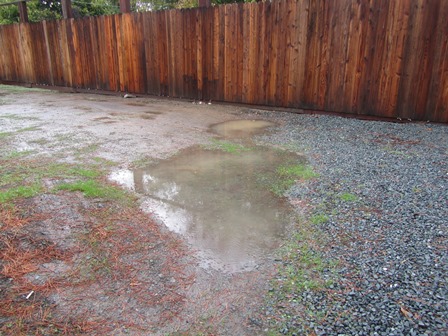
Last year, rain pooled in places around our property (among them, the driveway) because we hadn’t finished putting loads of gravel down
We have a decent gravel driveway that we finally put in. Flooding hasn’t been a problem. Our chickens don’t mind the rain either. Instead of huddling together in their dry little designer chicken house, they prefer looking for the worms and bugs that show up during and after a storm.
Also, I’ve been tapping away on my computer keyboard, pounding out my latest mystery-in-progress. I had a pretty good idea come to me after I woke up this morning. That means my mind is working creatively even when I’m not typing words. I’m plotting and visualizing scenes and scenarios, making linkage and associations. This novel will be number three in my Henny Penny Farmette series, and I’m pretty excited about it.
While the work continues on the house and on my book, I’m also getting ready make up holiday baskets for family and friends, searching for lovely boxes, baskets, and cookie tins.
But I think that if this big storm that’s been forecast to arrive in the wee hours of the morning does arrive on schedule, I’ll spend an extra hour in bed tomorrow. I love sleeping in when a storm is howling outside my window. Sleep and rest nourish my little gray cells, too, meaning I might be more prolific at writing, carpentry, and crafting. So bring on the storm.
Black Friday Alternatives
I suppose I just didn’t get the shopping gene in my DNA. So while everyone else shops the Black Friday specials, I’ll be doing repairs on a room of our farmhouse. The second bedroom doesn’t yet have the windows completely framed, joint compound and tape on the seams, or plaster on the walls.
It would have been lovely to sleep longer today–this day after Thanksgiving–but our newly adopted cat woke me early. I made coffee and plucked navel oranges from the tree to put into the juicer. After a bagel, coffee, and a glass of juice, I mentally ticked off a list of things I wanted to do today. And I’d get right on those tasks after I watched the sun rise and observed the wild birds foraging at the feeders and the squirrels chasing each other along the fence.
Nature is so seductive, I could have just as easily forgotten my to-do list and stayed outside, enjoying the fresh air and the natural world. I think it’s a terrific idea that many parks in California are waiving fees today to offer individuals and families the option of enjoying nature instead of shopping.
As for shopping, I think life could be much simpler if we just ask a question or two before purchasing: Do I really need it; or, do I just want it? For myself, or someone else?
I know the gift-giving holidays are weeks away. The season of sellers bombarding consumers with “buy” messages is upon us. Call me old-fashioned or blame it on my Midwestern farm-family upbringing, but I prefer to give and receive the gifts of self. Something homemade with love, if possible. Or the gift of time . . . extra hands to help me plant bulbs, put up blood orange jam, paint a room, or pluck eucalyptus leaves to make a holiday wreath.
What do people remember about shopping together? On the other hand, time spent with a friend, a child, or grandchild making a gift or doing something nice for someone can strengthen the bonds of love.
But back to my Friday punch list. I’ve checked my supplies for the day, and it looks like I’m out of Spackle. Arghh! I’ll have to go buy some. But this won’t be an impulse buy–it’s not something I want . . . it’s something I need to finish the job at hand. Enough said.
If you do love shopping and also enjoy reading, check out A BEELINE TO MURDER. See, http://tinyurl.com/p8d6owd
What Could Be Easier than Growing Irises in Raised Beds?
When we first moved to the Bay Area from Miami, the heirs to the property behind ours gave us some bearded irises that had been planted in the 1950s by their parents. I recall the beauty of irises on my grandmother’s farm in Missouri. She called them flags.

For a lovely raised flower bed, plant other bloomers like cosmos, geraniums, pansies, nasturtiums, and marigolds with iris cultivars
Mostly colored in deep purples and blues, white, and pinkish-beige, the bearded irises have added an aesthetic appeal to our farmette that was mostly just a big field with a tiny house in the middle. We’ve planted them in the ground, along fences, and in raised boxes.
Easy to grow and maintain, the irises have become one of our favorite flowers. We’ve kept them going in our garden and they’ve rewarded us with many new rhizomes.
As we’ve continued to restore the farmette, we’ve built many four by six feet boxes for raised beds. The materials cost roughly $125 per box. We like them because we can easily control the soil (building it up with compost, manure, and other amendments), drainage, tilling, and weeds. Recently we decided to make irises the mainstay of a raised bed border.
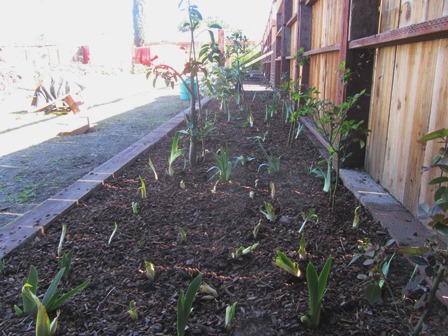
We’ve interplanted citrus and bearded irises in this raised bed spanning the length of the front fence
Over the weekend, we built a long raised bed that extends the entire length of the fencing on the southwestern side of our property. In it, we planted lots of citrus trees, climbing roses, and irises. If you are thinking of doing something comparable, have fun choosing from among the hundreds of cultivars of bearded and Siberian irises.
Plant them about three inches deep and a few inches apart in well drained, fertile soil. Irises need shade from the hottest sun and enjoy a deep drink of water, especially during blooming. I enjoy the ease of growing them in raised beds and love, love, love the magnificent color atop tall stalks when they bloom.
Creating Functional Space in Our Small Farmhouse Kitchen
“There’s never enough storage space!” It’s become a lament I want to banish from my frequent utterances.

Our farmhouse kitchen counter and cabinets during early renovation. Carlos cut the sunburst pattern from blue-black granite
At roughly 1,000 square feet, our house isn’t terribly small by the 1970’s standard when the average American home was 1,400 square feet. And by the 195o’s standard of 983 square feet, my house is positively roomy. However, today, the average American house footprint stands at 2,598 square feet. That said, there is a tiny house movement on and that’s a good thing for the environment.
Having lived in larger houses, I can honestly say I love this smaller home. The costs for energy, upkeep, homeowner’s insurance, and property taxes are considerably less. The need for interior furnishings shrinks, too.
The downside is there is less space for storage. We have had to maximize our options. I keep bees and beekeeper supplies like honey jars and lids as well as my cases of jam jars and lids and the final, finished products have to be stored somewhere. And then there are my cookbooks (I’ve cut the collection from over a hundred to a quarter of that).
My designer/architect husband Carlos Carvajal came to my rescue by carving out some space for bookcase in the wall between the kitchen and the bar area.
He also took space from the kitchen to create a laundry area with washer and dryer and hid them behind bi-fold doors.
The bar area has a bank of lower cabinets that can hold glassware, appetizer dishes, and serving platters. He re-created a new cabinet unit from a bank of old upper kitchen cabinets, mounting them on the wall above the granite counter-top with an inset sink.
A narrow moveable butcher block cart on wheels with a couple of shelves could give me a little extra storage, if we could find one that would fit in the limited space near the oven.
I think we’ve maximized our storage options in the kitchen and created a highly functional space so maybe I can now abandon that lament.
Urban Farms Make Sense for Lots of Reasons
Reduce city blight. Give city residents the opportunity to farm. Grow food for low-rent residents. Eliminate illegal dumping. Create public gardens on private land until the owner decides on another use. Lower property taxes for land owners. Improve the local environment. These are just a few reasons urban farms make a lot of sense and should be promoted.
As it turns out, the city of San Francisco is leading the way. The city has a new law offering financial incentives in the form of reduced property taxes for owners of empty lots who permit agricultural use of their land for at least five years or more.
Part of the statewide Urban Agriculture Incentive Zones Act, the law encourages potential urban farmers to convert weedy, empty lots or those covered in trash into gardens. These urban farmers necessarily would have to put in resources such as labor and money but the law ensures they cannot be forced out of their contracts, thus losing their investment.
The law is the brainchild of sustainable land-use advocates and state Assemblyman Phil Ting, D-San Francisco. Cities must first pass the necessary local ordinance and San Francisco has already done that.
Urban farmers must comply with local ordinances with regard to keeping bees and farm animals. But the idea of urban gardens reducing blight (which may also be prone to illegal dumping) has wide appeal for cities eager to stabilize property values and also provide more green spaces.
While other cities in California explore the environmental benefits of urban farms (including Fresno, Los Angeles, Sacramento, San Diego, and San San Jose), San Francisco leads the way.
A city lot must meet certain qualifications: it has to be at least one-tenth of an acre. Additionally, there must be no permanent buildings on the lot. Qualified lots are re-assessed with a significantly lower tax bill for its owner.The new tax assessment is based on the average rate of irrigated farmland.
The idea of more urban farms means a win for the city, local residents, the land owners, and the environment.
How My Real Life Informs My Art
Every story needs a setting, a world in which something happens. For my cozy mysteries, I didn’t set out to create a new world for my coterie of characters, I just appropriated details of the life I am living as a farmette dweller.
Daily chores on our Henny Penny Farmette provide plenty of fodder for my fictional stories. Our daily activities include chicken care, garden and orchard work, beekeeping, cooking and preservation of vegetables and fruits, renovating the antiquated farm house, fixing sheds, and building fences and retaining walls.
Stories need a sense of verisimilitude for readers to suspend disbelief and join the fictional journey. Drawing upon my real-life experiences, I can easily integrate my adventures in my books. And not only my activities, but also experiences of my architect husband who is ever-occupied with making our old house more liveable.
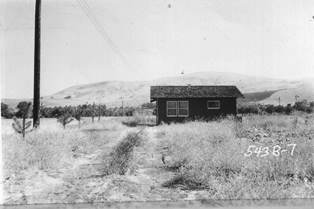
In this 1953 photo, our little house sat in a great, big field with not much around it; the dwelling faced Mount Diablo (still does) and the Delta and great central valley lie to the northeast
The tax assessor told me that our dwelling might have been a mining shack in the late 1940s (we live near Mt. Diablo and Lime Ridge where mining and rock quarrying were once important industries). We’ve also been told that our little house might have later served as a farm home (we live less than two miles from designated agricultural farmland). The structure desperately needed updating when we found it almost five years ago. But as settings go, the house and farmette work great.
We have since used recycled and reclaimed materials, sale items at big box DIY stores, and gifts (like lumber, stone, and windows/doors) from friends who do demolition on estates. We’ve visited companies that sell granite and asked for permission to take broken stone from their dumpsters. Thus, we’ve created a lovely bathroom floor with found materials that we’ve cut and sanded.

Light from a crystal chandelier dances off the new granite counter, but the floors were not yet installed when this photo was taken
Of course, the exact details of our daily activities may not make their way into my stories, but versions of them sometimes do. At the very least, such activities inform my storytelling. I daresay the chickens and bees serve important roles in my mysteries. And each new day brings new adventures, from foxes showing up to skunks and raccoons raiding our fruit and nut trees.
Lately, a new chicken showed up on our property (a heritage chicken that had the ability to fly over my neighbor’s fence). She’s been staying here ever since. Wild turkeys often take a path through the property and once or twice a gorgeous stallion named Romeo and its owner ride by and say hello. Such events can add textural details to the setting of a story.
Farmette Projects Don’t Stop, Even with the Rain
The rains have arrived in the Bay Area . . . finally. Although my hubby and I are thankful for the wet stuff, we weren’t quite ready.
Our sheds have leaky roofs. I also need to install a different kind of gate on my chicken run; one that won’t swell with moisture and get stuck so that I can’t open it. I close the gate at night against predators, but the chickens free range in the yard during the day.
Our supply of building materials is dwindling as we are completing some projects. Much of the stone and retaining wall materials, torn out from estates that are being re-landscaped, were donated to us. Carlos and I were only too glad to integrate them into our own landscape. We work on it little by little.
With mud everywhere, I probably appreciate more than anyone having the flagstone leading to the front door, however, we still need to fill the spaces between the flagstone with gravel.
We’ve built fences and put up the frame for an entrance trellis where the gate will go in. We also have constructed a porch trellis that I will grow wisteria over, but we have to install the porch floor first. We’re using plywood in the meantime.
The long half-circle driveway is packed dirt, although we have shoveled in gravel where my husband parks his truck. Now that the rains have arrived, the driveway is pretty muddy. We need to figure out whether we’ll put in gravel for entire length of the driveway (there’s some there now) or lay asphalt or stone.
So while it rains, I think about our master plan for the farmette. We’ve come a long way . . . but there’s still a huge distance to go and some projects can’t wait for spring like those leaky shed roofs.
Bumps and Scrapes–Just Part of the Renovation Process
I haven’t had to call on my first-aid skills in a while, but today I lost control of a tree trunk round (that must have weighed close to a hundred pounds). It broke the skin in several places, bruised the flesh, and caused swelling within minutes.

Silly me–if I’d worn boots instead of loafers, my leg would have been protected against cuts and bruises
Luckily, I didn’t break my ankle. This is my comeuppance, I suppose, for going against my architect husband’s admonition not to mess with those rounds regardless of how badly I wanted to keep work moving forward on the farmette landscaping at the front of our house.
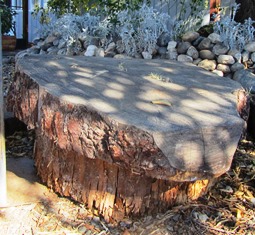
Two- to three-feet wide, these babies are no longer needed in the landscape and can trigger termite infestation when they lie against the soil
The way I see it, it’s only by us tackling something every day that we will ever be able to complete the restoration that this old place needs. I believe it’s been without tender loving care for at least a generation.
Last week, my husband brought in a bobcat and within a few hours had hauled away stone, dirt, and dead stumps. We can now lay paving stones to create a sitting area for outdoor entertaining. The floor he laid at my daughter’s house is pretty and functional. She tells me they love the area and so do their children and friends.

This patio floor that my husband recently laid required several stone shapes and two colors–gray and terra cotta
Out front, we’ve transferred the irises to a raised bed, but the tree that was severely diseased, as well as rocks and wooden stumps, are gone now.
My husband tells me we’re going to get some help with the landscaping work at the front of our property this week. So, in case he warms to the idea of letting me participate, too, I’ll get out my boots, bandana, and straw hat.
You can take the girl off the farm, but you can’t take the farm out of the girl. What can I say . . . I just love digging in the dirt even when it involves the personal risk of bumps and scrapes–isn’t that expected when doing renovation?
*Update on the foot–checked by a doctor and no break. I’ll be drop kicking turnips in no time!
 Facebook
Facebook Goodreads
Goodreads LinkedIn
LinkedIn Meera Lester
Meera Lester Twitter
Twitter








